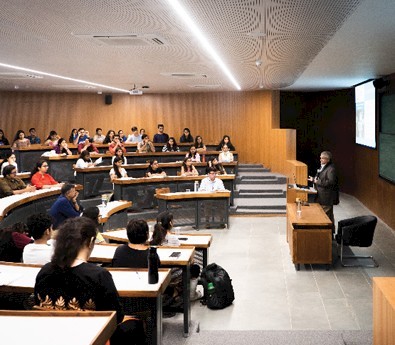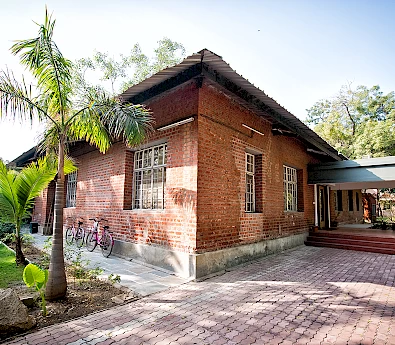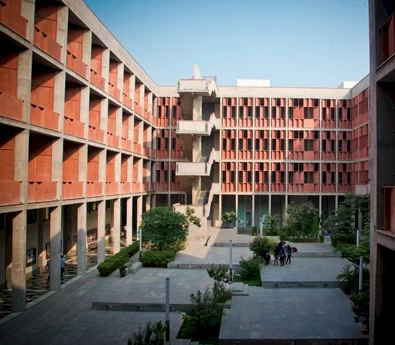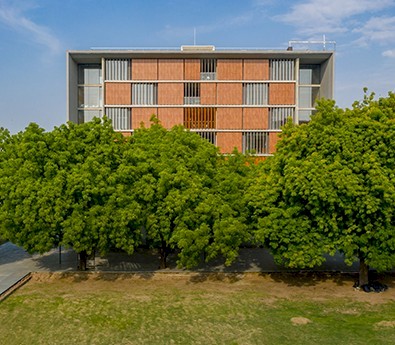
Amrut Mody School of Management
The Amrut Mody School of Management offers wide-ranging, multi-faceted management education through undergraduate, graduate and doctoral programmes. We also offer short-term certificate programmes for working professionals and other practitioners. The Management School is located in the heart of Ahmedabad, one of India’s most vibrant and historic centres of commerce. Its mercantile and industrial history underscore its present-day reputation as a hub of enterprise and new business ideas. In addition to its bustling streets, markets and sophisticated cultural life, the city is also home to many of India’s most reputed educational institutions, making it uniquely liveable for students and academics.

Bagchi School of Public Health
The World Health Organization (WHO) considers public health as all organised measures (public or private) to prevent disease, promote health, prolong life among the population as a whole, and provide conditions where people can be healthy. This necessitates large population-based perspectives and approaches. The Bagchi School of Public Health will build on the unique strengths and focus of Ahmedabad University on interdisciplinary education to train individuals equipped to develop innovative solutions that are both contemporary and wholistic to address the challenges of the 21st century. Public health includes physical and mental health as well as wellness, and the problems, as well as solutions, are complex and interdisciplinary. Ahmedabad University’s unique stepwell logo aligns closely with public health as it encompasses many positive dimensions that impact health, such as physical activity, social interactions as well as community access to water, and disaster preparedness in this era of climate change. The Bagchi School of Public Health aims to develop leaders who can offer contemporary interdisciplinary solutions, drawing from the Indian ethos, to address ongoing and unimagined challenges.

School of Arts and Sciences
The School of Arts and Sciences has five divisions, Biological and Life Sciences, Mathematical and Physical Sciences, Humanities and Languages, Social Sciences, and Performing and Visual Arts, spanning the liberal arts and sciences. It practices collaborative, interdisciplinary learning, and helps students to acquire the ability to analyse as well as synthesise ideas and information so they can form cogent arguments and creatively express themselves as they progress in academic life.

School of Engineering and Applied Science
The School of Engineering and Applied Science offers undergraduate, graduate and doctoral programmes. The School emphasises project-based learning and a student-centric pedagogy. This approach is aimed at creating an aptitude for design, innovation, and finding solutions for complex problems.

Undergraduate College
The Undergraduate College oversees the philosophy, structure and implementation of undergraduate programmes at Ahmedabad University. It works with the Schools at Ahmedabad University towards the overall enhancement of the University experience of the students. It contributes in building a student-centric environment by continuously engaging with the students and enabling them with opportunities for academic growth.

Graduate School
The Office of Dean of Graduate School and Research oversees the Graduate School as well as Research at the University. It coordinates the policies of all graduate programmes and formulates the guidelines for conducting doctoral programmes, providing oversight on quality and maintaining the highest standards. The Dean is assisted by a five-member Graduate Faculty Committee that makes operational decisions and suggests policy recommendations to the University.

Ahmedabad Design Lab
Ahmedabad Design Lab is a research, practice, and teaching space for understanding challenges facing society and finding innovative solutions to these challenges. The Lab is premised on using design as the glue to bring together systems of knowledge from multiple disciplines for problem-solving. The Lab will, in particular, work on issues faced by the city of Ahmedabad in social, economic, and governance domains, thereby helping reimagine the city to become one of the most vibrant cities in the country and the world.

Centre for Heritage Management
Centre for Heritage Management offers specialised education in heritage studies and professional management of diverse heritage resources. This includes, but is not limited to, the management of monuments, crafts, museums, natural resources, tourism, urban development; as well as intangible heritage such as languages, music, customs and the performing arts.

Centre for Inter-Asian Research
The Centre for Inter-Asian Research aims to bring together scholars and practitioners to work towards imagining what the inter-Asian century might be like. The imagination would span modes of everyday living and doing, modes of organizing, creation of institutions and networks, development and deployment of technology, economic and social choice-making, re-imagining political and economic structures, and experimenting with diverse artistic forms.

Centre for Learning Futures
The Centre for Learning Futures (CLeF) designs and implements initiatives to support teaching and learning in the University. The Centre offers courses in academic reading and writing, and workshops in study skills. It also offers, through its Learning Initiatives, opportunities for curricular experimentation and pedagogic innovation as also platforms for integrating learner-centric technological solutions in higher education.

Global Centre for Environment and Energy
Global Centre for Environment and Energy (GCEE) is a one-of-its-kind Centre of Excellence at Ahmedabad University. The Centre fosters and pursues interdisciplinary research, and designs technological and social experimentation related to climate change, energy and natural resources.

International Centre for Space and Cosmology
The International Centre for Space and Cosmology is a new initiative that will drive cutting edge research in the areas of Space, Astrophysics and Cosmology, train the next generation of researchers, and advance public understanding of this very exciting domain of Physics. and for the dissemination of important developments in these areas amongst the general public. It will also reach out to young students to encourage them to consider a research career in Space and Cosmology, and provide them with information regarding opportunities in these areas.

Sahyog: Centre for Promoting Health
Ahmedabad University’s School of Public Health has forged a synergistic partnership with Self Employed Women’s Association (SEWA) to establish the Sahyog Centre for Promoting Health at the University campus, in accordance with the need to enable healthcare knowledge among the under-privileged. Through Sahyog, which means collaboration, the Centre has combined strengths in epidemiology, health promotion, research, training, community empowerment, and outreach. Building on the slogan 'Inspire sustainable healthy changes,' the Centre aims to improve health locally, nationally, and globally through viable, sustainable, and scalable initiatives, and to empower individuals and communities to take charge of their health and inspire others, creating a domino effect. Sahyog reflects an engaged learner who enhances an organisation's knowledge through community experience, active participation and cooperation. It emphasises and accepts the community's role in making the organisation's programme successful and achieving its goals.

VentureStudio
VentureStudio is a startup incubation centre at Ahmedabad University. It was established in 2011 in collaboration with Stanford University Design School. Since inception, the Centre has supported over 100 startups in diverse technological domains such as Healthcare, BioTechnology, Life Sciences, Medical Devices, Diagnostics, Engineering, Industry 4.0, and Deep Tech Software Technologies. In 2017, the Centre was chosen to support BioIncubation activities in Gujarat by the Department of BioTechnology. VentureStudio also hosts the Prayas Shala Fab Shop as well as the Bio-NEST Biotechnology Lab to provide solid infrastructure support to upcoming startups.